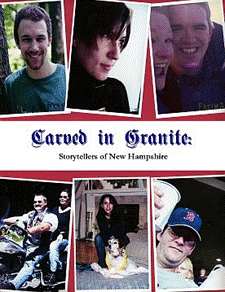
 |
Carved in Granite
|
Please go to the new Coffee Coaster site implemented more gracefully in Wordpress. This page @ http://brianrwright.com/CoffeeCoasterBlog/?p=4210 |
 2008, SciArt Media, 134 pages (as PDF)
2008, SciArt Media, 134 pages (as PDF)
"I so totally respect these author people, particularly those who brave the rarefied markets of contemporary cultural prose and poetry, such as we find in the best popular magazines. They're continually putting their hearts on the line for the opportunity to make a handful of ducats, perhaps someday to have their names up in lights... or at least take an audience with Oprah."
Well, both "budding" and more established... but none of them to my knowledge widely celebrated. My Free State literary comrade in arms James Maynard—author of the classic cultural perspective The Light of Alexandria, and noteworthy writer of both kinds of fiction: science and everything else—asked me to review this collection of short stories from aspiring New Hampshire writers. I said gladly. Tho sadly I confess to seldom broaching the pages of shorter fiction and do not generally travel, yet, in cultivated circles of those who pen stories simply for the imaginative fun of it all.
I so totally respect these author people, particularly those who brave the rarefied markets of contemporary cultural prose and poetry, such as we find in the best magazines. They're continually putting their hearts on the line for the opportunity to make a handful of ducats, perhaps someday to have their names up in lights... or at least taking an audience with Oprah. Carved in Granite is a nice mixture of styles and types, from libertarian sci-fi to presumably wholly nonfictional walks down memory lane.
Jim's piece, "Zero," starts off the anthology with a not-too-future prospect of Real ID—on steroids and bromides—running amok. Today, we all hear the Kleptobots' soothing words that by implanting these little biochips, we can "save the lives of children." "Do you hear me?! Precious, little children!" [Reminds me of General Jack T. Ripper in Dr. Strangelove discussing the horrors of fluoridated water.] Anyway, it's a precautionary tale, in which someone has developed nanotools for saving a loved one. The downside is the state can now increasingly control the biochemistry of everyone... well, something's got to give. I enjoyed the crisp dialog and some of his unique literary devices, such as people's first names all seeming to have apostrophes.
My next read, "Stories from Ocean Grove," by Jonathan Wood of Raymond, was of the reminscent sort. As I say, I think these must be autobiographical and therefore nonfictional. But who knows, I love the prose: check out the following take-me-back phrasing:
My summers were lived so intensely. There was work and the beach every hot day, the boardwalk and sand every breezy evening. Dances twice a week. Who's that new girl? Do you think she wants to dance? ... With me? Holding hands on the walk home. A kiss at the corner, you just knew her parents or aunt or grandmother [would be] waiting on the porch. How long was she going to be in town? A week? Two? Would she be coming back next summer? Hope and heartache wrapped up in a summer smile.
Then the story about the fire, "Minute Man," by Michael Dempsey, sends up some intense moments of quiet, or at least unheralded, heroism in a volunteer fire department. The action language hits you just as if you were being told the whole episode by someone from the neighborhood. Which again suggests to me this story isn't fictional, but actually occurred in real life, and these gentlemen are available for talking business. Either way, it makes for a great, even inspiring, read:
The three firefighters had positioned themselves at the corner of the main house, and the breezeway. They could no longer see the truck they arrived on. The smoke was thick, and they could barely see each other. Stewart was on the nozzle motioning Mike and Skip forward along the breezeway. On hands and knees, trying to stay low under the heat of the main fire, the three men edged forward.
Suddenly there was a powerful explosion.
I'm tempted to walk through each of the pieces and tell you what I like, but you can check out the synopsis on the Web and perhaps visit the site to buy a copy. I understand this whole week (starting
July 14, 2008) they're launching the promotion. Well, okay a couple of others: "Johnny Nightingale" is definitely fictional, and a shorter piece, as nice an homage to the essence of music one is likely to find. I'm also tempted to excerpt, so why not...
“Listen Chris,” he replied, “you can turn every feeling, every fear, everyday into something beautiful… Music makes me feel like I’m in love, and it never goes away. It gives me something to wrap my
arms around twenty-four seven.”
So that's a wistful, and uplifting, piece. Contrast that to "Damn," suitably named, by Ron Kaiser. Rebecca of Sunnybrook Farm it ain't. Here's how it begins:
We called my step-dad Damn on account of his swearing, though never to his face. He bent all conventions of grammar to fit the word “damn” into practically every sentence. If it was raining, it was
“God damned raining.” If it was a kitten, it was a “God damned kitten.” He was always pissed off about something, and it was always my stepbrother James that caught hell for it, regardless of fault. If it rained before we got the hay in, James got it. When I accidentally broke the truck windshield, he caught it. Even the animals caught hell for it. Everybody caught hell but me. Maybe it was because I was the one thing on that farm that wasn't his own.
I get a special charge out of this one, one big bail o' "when the pigs ate grandpa," so to speak. And if you were knocked around as a child by a mean ol' step-parent, I think you'll derive a hefty amount of emotional fuel here. The piece also delivers, as do many of the others, a wonderful sense of humor.
Finally, "Trash Talk," by Melissa Rossetti, gives an alternative perspective on the relatively recent New Hampshire contrivance of mandatory recycling at your local, friendly transfer station.
[Roy says] “It’s trash, garbage! It’s used, broken, rotting, and smelly and you’re telling me I have to wash it before I can throw it out? Then I have to PAY to throw away something I can’t use. I’m not buying it, I’m getting rid of it and apparently even though I pay my taxes for this here ‘fine facility’ you’re still gonna charge me! And why the hell do you need to SEE my trash through a clear bag? Did I move to New Hampshire or communist Russia?”
Live free or go find a dump.
There are some others, and again, check out the circular on the Website for a brief description. I've commented on some of the ones I've read—I didn't read all 12—and I have to say the quality is first rate. I mean the quality one expects if one were to walk into Barnes and Noble and purchase a book of stories from one of your favorite international celebrity authors. These are the best and most straighforward of words, folks. Thoughtfully concocted by your neighbors. Well worth the freight.
Let's hope the tradition continues.
###
 |
 |
|||
| New Pilgrim Chronicles Forum |